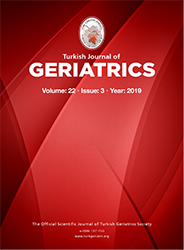2Samsun Training and Research Hospital, Microbiology, Samsun, Turkey
3MediBafra Hosipital, Neurology, Samsun, Turkey
4BĂĽlent Ecevit University, School of Medicine, Neurology, Zonguldak, Turkey DOI : 10.31086/tjgeri.2019.110 Introduction: Gram-negative bacteria such as Helicobacter pylori (HP) are becoming increasingly implicated in the etiology of Parkinson"s disease (PD). This study aimed to investigate the association between PD and HP infections.
Materials and Method: Eighty-three patients with PD and age- and sex-matched healthy control subjects with no history of PD were enrolled. Patients with secondary Parkinsonism and severe cognitive impairment were excluded. All patients were staged according to the Hoehn and Yahr scale. We obtained 10 mL venous blood samples from all patients and controls. The plasma was separated, and samples were stored at ?200°C. IgG antibodies developing against HP were investigated using the ELISA method. Values >5 IU/ml were considered positive.
Results: Eighty-three patients and 81 controls were included in the study. HP IgG was positive in 87% of the patient group and in 74% of the control group. The median antibody titer in the patient group was higher than that in the control group (p=0.0019). No significant relation was observed between disease severity and IgG positivity (p=0.947). However, a moderate correlation was observed between disease severity and mean IgG level (r=0.277, p=0.011). HP IgG positivity (OR 3.15, 95% CI 1.23?8.07, p=0.002), a family history of PD (OR 2.57, 95% CI 1.02?4.13, p= 0.03), and male gender (OR 2.05, 95% CI 0.95?6.99, p= 0.02) increase the likelihood of PD.
Conclusion: HP infections may trigger various abnormal or enhanced immunological processes in patients diagnosed with PD; these abnormal immunological activities are probably involved in the disease pathogenesis.
Keywords : Parkinson disease, Helicobacter pylori, Disease severity
